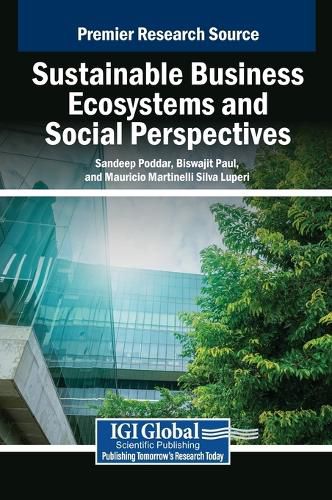Readings Newsletter
Become a Readings Member to make your shopping experience even easier.
Sign in or sign up for free!
You’re not far away from qualifying for FREE standard shipping within Australia
You’ve qualified for FREE standard shipping within Australia
The cart is loading…






This title is printed to order. This book may have been self-published. If so, we cannot guarantee the quality of the content. In the main most books will have gone through the editing process however some may not. We therefore suggest that you be aware of this before ordering this book. If in doubt check either the author or publisher’s details as we are unable to accept any returns unless they are faulty. Please contact us if you have any questions.
The United Nations Sustainable Development Goals (SDGs) provide businesses with a framework to align their operations with global challenges, promoting a shift towards sustainability in all sectors. In an interconnected world, creating sustainable business ecosystems that balance economic, social, and environmental objectives is essential for long-term success. This approach enables businesses to reduce costs, improve efficiency, and differentiate themselves, while also managing risks and seizing growth opportunities. The rise of multi-stakeholder partnerships highlights the importance of collaboration in achieving the SDGs, particularly in emerging markets. Further exploration of the latest strategies for fostering sustainable business ecosystems may reveal new perspectives on the social impact of sustainable development. Sustainable Business Ecosystems and Social Perspectives examines the intersection of environmental responsibility and social equity within modern business practices. It examines circular economies, responsible innovation, and inclusive growth, emphasizing the need for businesses to thrive while creating value. This book covers topics such as hospitality and tourism, marketing and consumer science, and small and medium enterprises (SMEs), and is a useful resource for business owners, environmental scientists, sociologists, academicians, and researchers.
$9.00 standard shipping within Australia
FREE standard shipping within Australia for orders over $100.00
Express & International shipping calculated at checkout
This title is printed to order. This book may have been self-published. If so, we cannot guarantee the quality of the content. In the main most books will have gone through the editing process however some may not. We therefore suggest that you be aware of this before ordering this book. If in doubt check either the author or publisher’s details as we are unable to accept any returns unless they are faulty. Please contact us if you have any questions.
The United Nations Sustainable Development Goals (SDGs) provide businesses with a framework to align their operations with global challenges, promoting a shift towards sustainability in all sectors. In an interconnected world, creating sustainable business ecosystems that balance economic, social, and environmental objectives is essential for long-term success. This approach enables businesses to reduce costs, improve efficiency, and differentiate themselves, while also managing risks and seizing growth opportunities. The rise of multi-stakeholder partnerships highlights the importance of collaboration in achieving the SDGs, particularly in emerging markets. Further exploration of the latest strategies for fostering sustainable business ecosystems may reveal new perspectives on the social impact of sustainable development. Sustainable Business Ecosystems and Social Perspectives examines the intersection of environmental responsibility and social equity within modern business practices. It examines circular economies, responsible innovation, and inclusive growth, emphasizing the need for businesses to thrive while creating value. This book covers topics such as hospitality and tourism, marketing and consumer science, and small and medium enterprises (SMEs), and is a useful resource for business owners, environmental scientists, sociologists, academicians, and researchers.